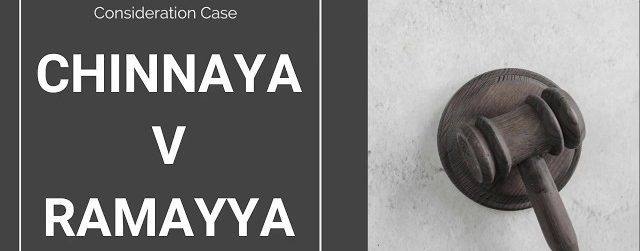Full name of the case– Chinnaya V. Ramayya (1882) ILR (1876-82) 4 Mad 137
Deciding Bench of Judges– Innes J, Kindersley J
Date of Judgement– 21st October 1987
Deciding Court of Law– Madras High Court
Parties to the case-
- Appellant- Venkata Chinnaya
- Respondent- Venkata RamayyaGaru
Introduction to the case
This is a leading case for consideration and the concept of privity of contract. As per section 2(d) of the Indian Contract Act, 1872, consideration means something in return. It is one of the essential elements of a valid Contract and without any consideration between the parties, there cannot be a valid contract between them. Privity of Contract is the concept that says that no party other than the parties to the contract can sue for the contract. So, no outsider or third party can extract any benefit out of the contract, except the parties to it. However, there is one exception to this rule- if the third-party acts as an Agent, then it may be able to sue for non-compliance to the contract. We would study all these objects at a later stage in this case.

Facts
There is a lady who plays a major role in this case through her estate. She gives an amount of this land to her sister. Later, she gifts a part of her land or estate to her daughter in the form of a gift. She gifts this estate to her daughter on the condition that she (the daughter) must pay Rs. 653 as an annuity to the lady’s sister. To give effect to this condition, she signs an agreement to pay Rs. 653 as an annuity to her mother’s sister.
The issue started after the death of the lady and when the daughter, hereafter referred to as the respondent of the case, Ramayya, after taking possession of the land, disagreed to pay the annuity to her mother’s sister, Chinnaya. Aggrieved at this, the Appellant, Chinnaya filed a case against Ramayya for non-payment of Annuity as against promised through an agreement.
Issues
The main issues of this case were-
- if the Appellant can initiate an action against the respondent based on non-payment of the amount that has been promised through an agreement
- Though the agreement was entered into between the Respondent and her mother, would the appellant still be liable to receive the compensation that has been promised in the said contract
It was argued by the Respondent that the land or the estate being referred to was received by her from her mother as a gift. And hence she has no obligation to pay any amount as a consideration to the Appellant. Also, the contract is referred to was between the Respondent and her mother and thus, the Appellant has no say in such a contract after the death of Respondent’s mother.
As against this, when the respondent accepted the gift deed from her mother, she simultaneously entered into the contract that binds her to pay Rs. 653 as an annuity to the appellant, even after the death of her mother.

Judgement
It was decided by the Court that the agreement giving effect to transfer of the estate to the respondent by her mother as a gift and the agreement to pay annuity are simultaneous agreements. Hence both of these agreements shall be considered as a single transaction considering the definition and explanation of compensation that is given under section 2(d) of the Indian Contract Act, 1872.
Thus, it shall be the duty of the respondent to pay the said consideration as she agreed to do so while accepting the estate as a gift from her mother.
Conclusion
The contract was between the respondent and her mother, and even though the appellant was not a party to the contract at the time of signing the contract, the appellant still claims damages from the respondent. The appellant may be a stranger to the consideration, but shall still be considered a part of the contract. This is decided as per section 2(d) of the Indian Contract Act, 1872 which says that ‘Consideration may be given by the promise or anyone on her behalf.’
It is to be considered here that compensation may be paid by one person to the other directly or through a third person, but it shall still amount to consideration. Thus, the gift agreement and the agreement to pay the annuity shall be considered as part of a single transaction.

what do mean by the section 2(d) mentioned in the conclusion can u please ellaborate and explain the section for better understanding like how is the promise in the contract ?
Hello
In contract act there are 266 sections. The 2 section deals with the definations of terms in the act. 2(d) deals with the defination of consideration.
Section 2 d means
Defination of considration ..
When at the desire of the promisor, the promisee or any other person has done or abstained from doing,
or does or abstains from doing or promises to do or abstain from doing something, such an act or
abstinence or promise is called consideration for the promise
Can you please tell me that consideration may move from promisee or any other person , here who is the third party ? If Chinnaya then how
Nice